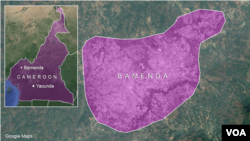The streets were empty Monday in the Cameroonian city of Bamenda, as residents honored a call to strike over the increasing use of French in English-speaking parts of the country.
A client and her attorney argue outside a courthouse in Bamenda as bystanders listen in. The client, Ashu Gerorgette, wants her lawyer to defend her in court, after she was accused of illegally occupying a piece of land she inherited from her father.
But the attorney refuses, citing the ongoing strike by Cameroon's English-speaking lawyers.
“As we speak now somebody is constructing on the [piece of] land and I do not have any power to stop him,” Georgette said. “I have been waiting for the court to render justice, but my lawyer does not come.”
Strike started in September
Lawyers in the English-speaking southwest and northwest regions of Cameroon called the strike in September, to protest what they called the overbearing use of the French language.
English speakers constitute 20 percent of Cameroon's population, and the constitution says English and French inherited from colonial times are equally important.
But most official documents are only in French, and judges, administrators and teachers with little understanding of English are often sent to work in English-speaking regions.
Teachers, youths join the protest
The lawyers have been joined by teachers and supported by young people. Protests in November led to clashes with the military that left several people dead, hundreds missing or wounded, and scores under arrest.
The government opened up negotiations, but the striking teachers and lawyers stormed out.
The leader of the striking lawyers, Bobga Harmony, says they will resume talks once authorities release youths who were arrested for burning police stations, vehicles, and Cameroon's national flag during the protests.
"We maintain our disposition as civilized learned men to dialogue, and dialogue does not mean you are giving up your position,” Harmony said. “You simply market your position to the understanding of the other side and any other side who seeks peace will buy it rather than accuse infants of terrorism in a situation where that word has no place.”
Arrested protesters missing
Harmony says the whereabouts of some of the arrested protesters is not known.
Rights activists like Joseph Chongsi of the Center for Human Rights and Peace Advocacy, have called on officials to reveal where the protesters are being held.
"Cameroon's government should without delay, set up an independent and impartial investigative commission to ensure thorough, prompt, effective and impartial investigation of all suspected cases of death especially those in custody,” Chongsi said.
In an address on December 31, President Paul Biya said he was open to talks with the protesters, but warned he will never accept any attempt to destabilize what he called Cameroon's hard-earned national unity.




